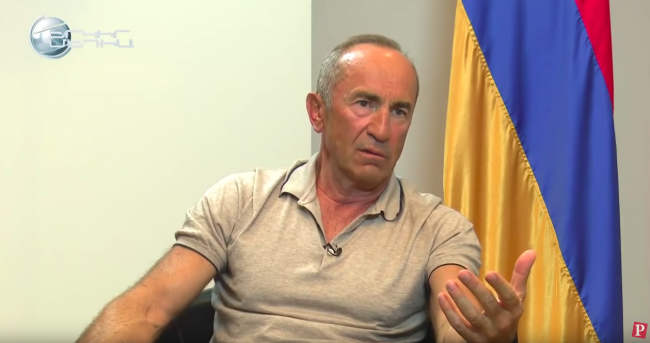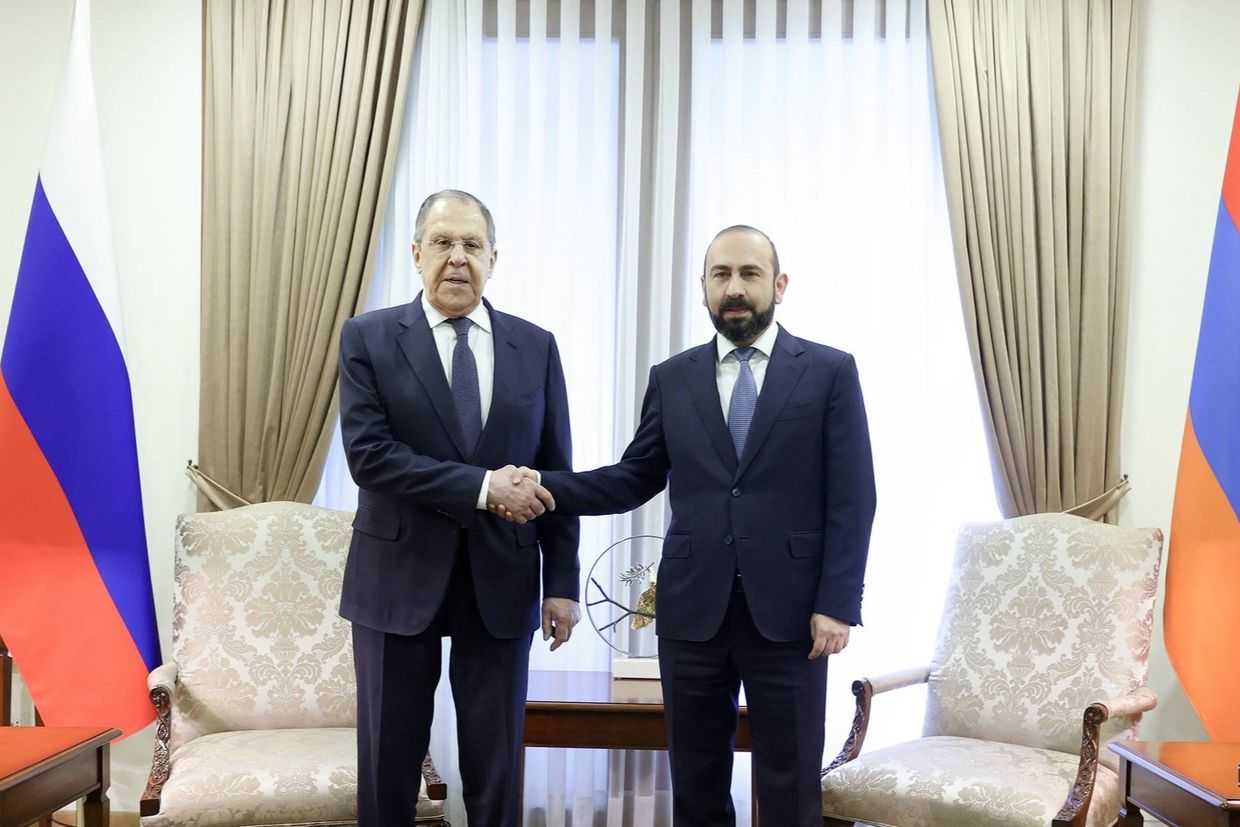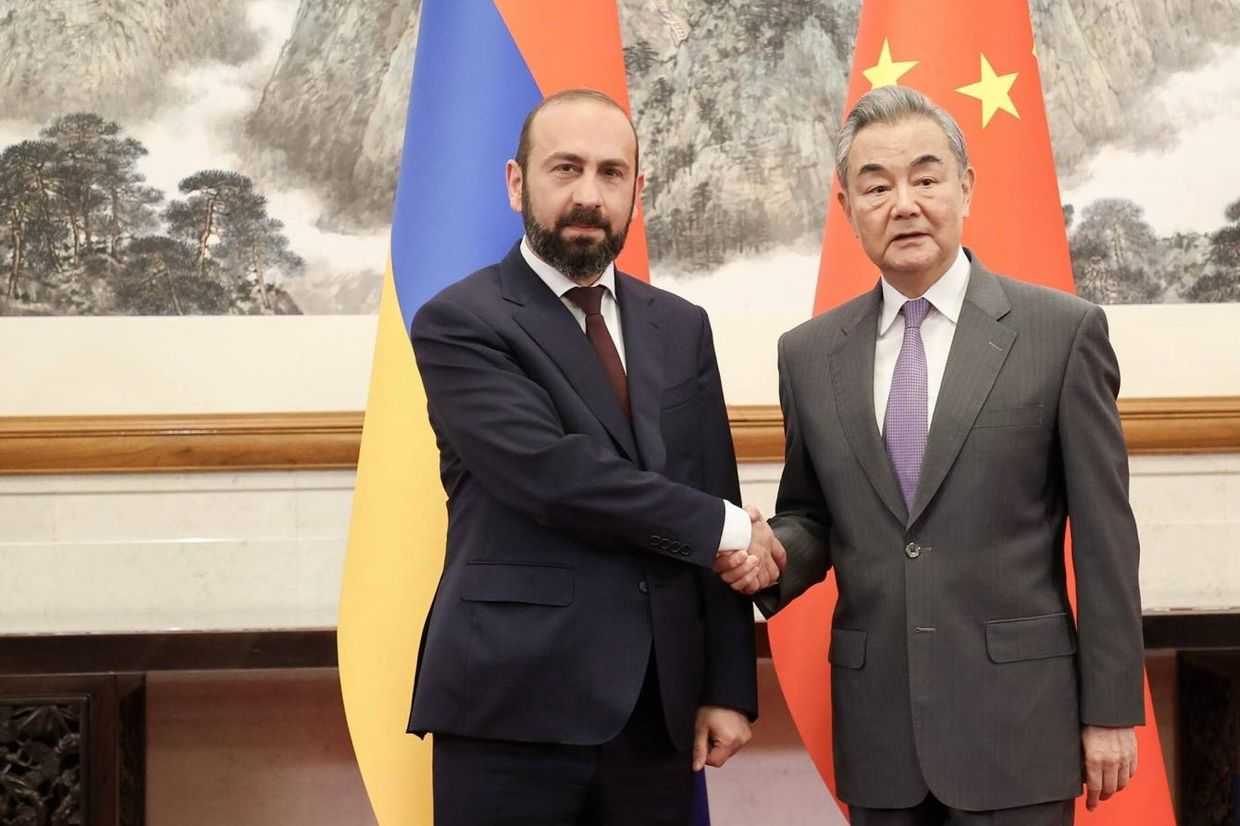

 ‘Consider me back’, former President Robert Kocharyan replied when asked if he was returning to Armenian politics in an interview with Armenian TV station Yerkir Media on Thursday. Kocharyan, who is awaiting trial charged with ‘breaching the constitutional order’, put his decision down to the ‘inexperience’ of the current government.
‘Consider me back’, former President Robert Kocharyan replied when asked if he was returning to Armenian politics in an interview with Armenian TV station Yerkir Media on Thursday. Kocharyan, who is awaiting trial charged with ‘breaching the constitutional order’, put his decision down to the ‘inexperience’ of the current government.
Kocharyan said that the ‘format’ of his political activities would depend on a ‘complex geopolitical situation’, which was the reason for his comeback, and which, according to him, the current government has failed to comprehend. He said he would reach out to ‘different people differently’ for political cooperation.
Among the foreign policy challenges facing Armenia, Kocharyan listed strained Russian–American and Iranian–American relations, as well as Turkey’s ‘aggressive policy’ that he said was no longer constrained by its pro-European aspirations. Kocharyan said the government consisted of ‘incompetent individuals’ too ‘inexperienced’ to deal with the Nagorno-Karabakh conflict resolution process.
The former president criticised Prime Minister Nikol Pashinyan for what he called Armenia’s disengagement from the negotiation process. ‘The head of state cannot step aside and say that he is washing his hands’, said Kocharyan, referring to Pashinyan’s call for the direct participation of Nagorno-Karabakh’s authorities in the negotiation process. On a visit to Nagorno-Karabakh on 9 May, Pashinyan argued that negotiations would be ineffectual without the party in conflict at the table, and that Armenia could not act on its behalf.
Kocharyan called Pashinyan unqualified for his post, adding of the new government that it would be impossible to have sufficient experience after only having worked for ‘some non-governmental organisations’ financed by George Soros, and possibly with money ‘coming from Azerbaijan or Turkey through various funds’.
Kocharyan underlined that ‘even the worst negotiations are better than war’, so the current Armenian government should be taking part in them. The former president expressed a readiness to meet Pashinyan, to share his experience in Nagorno-Karabakh negotiations.
He also insisted in the interview that corruption is omnipresent, occurring even in the US and France, but denied using his powers for personal enrichment. Kocharyan further rebutted opponents’ claims that his administration fostered a ‘clearly structured corruption pyramid’ and monopolies, offering as evidence the high rates of economic growth under his presidency.
He said that the fuel market was diverse, ‘supplied by 16–17 companies’, while ‘gas supply and electricity generation are natural monopolies’. In contrast, Kocharyan criticised the government for a lack of economic strategy, which according to him, ‘cannot be replaced’ by the Pashinyan government’s anti-corruption campaign, nor with ‘arbitrary tax audits’ that ‘scare off investors’.
‘Fighting corruption — it’s not just arrests, demonstrations of power, or people in masks. It is, first and foremost, a series of steps in a number of directions’, said Kocharyan. The former president complained that the government had yet to present ‘any actions or documents’ for economic development.
Kocharyan downplayed the celebration of Pashinyan’s 100th day in office, suggesting that even a gathering of 100,000 people in the center of Yerevan does not represent an ‘overwhelming majority’ of Armenian people. Kocharyan described supporters of Pashinyan and his administration as an ‘active’ and ‘aggressive’ part of society that is unwilling to let others voice their opinions. He urged those being silent ‘not to fear’ and to ‘actively participate in political life’.
March 2008 events and investigation
On 26 July, the authorities charged Kocharian over the dispersal of anti-government protests in 2008 that left 10 people dead. The Special Investigation Service argued that involving the army in the political standoff resulted in the ‘overthrow of the constitutional order’, punishable by 10–15 years in prison. The former president has claimed that the army was not involved in clashes with protesters.
Kocharyan accused investigative bodies of abusing their authority by ‘forming negative expectations’ of his guilt before the trial. He said the case against him was ‘based on lies’ and that the charges were ‘politically motivated’. If his case were presented to the European Court of Human Rights, Kocharyan said, he was confident that he’d be ‘cleared of any wrongdoing’.
The former president pointed out that he was not allowed to speak about the details of the case against him, criticising the secrecy that prevents him from making his case publicly. He argued, however, that if he had not announced a state of emergency in March 2008, he would be criticised today for inaction and ‘the inability to act [accordingly] as president’. ‘After all, at the core of Armenian law, the president is the guarantor of constitutional order’, Kocharyan noted.
The former president said that prosecutions against him and other former senior officials would complicate Armenia’s relationship with Russia. He also harshly criticised Pashinyan for urging Russia to ‘adapt to new realities’.
Kocharyan’s interview, his second with Yerkir since being charged, was aired three days after the Court of Appeals ruled his pre-trial detention unlawful and released him. This decision was met with frustration from the authorities, and protesters forced Kocharyan to cancel a press-conference on 14 August.
[Read more about protest against the former president on OC Media: Armenian former president Kocharyan released on bail]
Emil Sanamyan, a fellow at the Institute of Armenian Studies at the University of Southern California, said Pashinyan was likely to retain strong public support and achieve a majority win in the next elections. Sanamyan told OC Media that the Republicans and the Armenian Revolutionary Federation, the former ruling parties that together still hold a majority of seats in Armenia’s parliament, the National Assembly, have already backed Kocharyan.
‘The Kocharyan–Pashinyan race is likely to emerge as the main domestic political contest of the next several years. Armenia has an established tradition of former leaders staging a political comeback. This happened under Ter-Petrosyan, Kocharyan, and Sargsyan — when they were challenged by Manukyan, Demirchyan, and Ter-Petrosyan, respectively — though none were ultimately successful. We seem to be witnessing a new page of this tradition’, said Sanamyan.
Grigor Atanesian, a political commentator and Fulbright scholar at The Missouri School of Journalism, told OC Media that the ‘Republicans are still taken aback by their defeat, whereas Kocharyan appears more energetic and proactive’. He said he consequently expects Kocharyan to lead the ‘counter-revolutionary movement’. According to Atanesian, despite running an aggressive social media campaign and placing ‘puff pieces’ in the media, ‘Kocharyan’s chances of gaining substantial political support are miniscule’.







